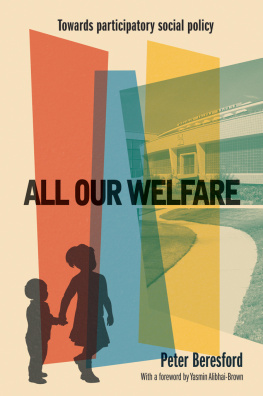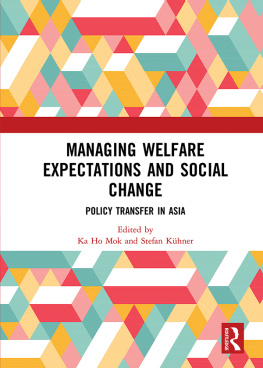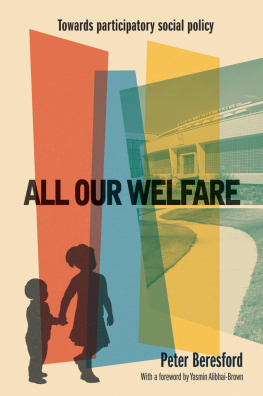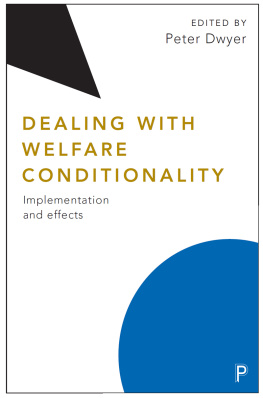ALL OUR WELFARE
Towards participatory social policy
Peter Beresford
First published in Great Britain in 2016 by
Policy Press University of Bristol 1-9 Old Park Hill Bristol BS2 8BB UK Tel +44 (0)117 954 5940 e-mail
North American office: Policy Press c/o The University of Chicago Press 1427 East 60th Street Chicago, IL 60637, USA t: +1 773 702 7700 f: +1 773-702-9756 e:
Policy Press 2016
British Library Cataloguing in Publication Data A catalogue record for this book is available from the British Library
Library of Congress Cataloging-in-Publication Data A catalog record for this book has been requested
ISBN 978 1 44732 894 0 paperback
ISBN 978 1 44732 893 3 hardcover
ISBN 978-1-4473-2897-1 ePub
ISBN 978-1-4473-2898-8 Mobi
The right of Peter Beresford to be identified as author of this work has been asserted by him in accordance with the Copyright, Designs and Patents Act 1988.
All rights reserved: no part of this publication may be reproduced, stored in a retrieval system, or transmitted in any form or by any means, electronic, mechanical, photocopying, recording, or otherwise without the prior permission of Policy Press.
The statements and opinions contained within this publication are solely those of the author and not of the University of Bristol or Policy Press. The University of Bristol and Policy Press disclaim responsibility for any injury to persons or property resulting from any material published in this publication.
Policy Press works to counter discrimination on grounds of gender, race, disability, age and sexuality.
Cover design by Soapbox Design
Front cover: Image of Finsbury Health Centre by permission of Avanti Architects
Readers Guide
This book has been optimised for PDA.
Tables may have been presented to accommodate this devices limitations.
Image presentation is limited by this devices limitations.
Contents
Ours is an age of rage, miserliness, crudity and startling ignorance. Seventy years ago, although Britons were exhausted and depleted by barbarous world wars, they were generous, idealistic, hungry for education and collectivist. That past and our present didnt just happen. Politics, policies and national conversations make, change and manipulate public attitudes, sometimes to prepare the ground for major ideological or economic remodelling .
After the two world wars, the poor and working classes would, in time, have wearily returned to the old, unjust status quo. In 1945, before this fatalism set in, while the wounds and horrifying memories were still fresh, the Labour government tapped into and drew on the nations anguish and insecurities as it embarked on reconstruction and radical change. The people were primed, made ready for the welfare state. It, was, in effect, a quiet, very British, revolution. Without the pain of war, without astute politicking there would have been no gain.
Margaret Thatchers counter revolution aimed to incapacitate this welfare state. Men and women, she believed, had obligations only to their own families. She wanted this nation to be like the USA, ultra competitive, avaricious, selfishly Darwinist. It took longer than the Thatcherites imagined, to get the mind shift in Britain, partly because social democracy was well embedded and generations had got used to free healthcare, education, social care, state help from cradle to grave. But the seeds sowed by Thatcher in the late 1970s, diligently watered and fertilised over the years, finally bore fruit. A growing number of Britons now think the welfare state is a tax burden and a disincentive to those who are lazy, dependent scroungers. In the last election, in May 2015, we witnessed internecine feuds between those on benefits, between indigenous and migrant families living in social housing, between various groups of low paid workers, and growing ethnic mistrust. Millions voted for a party which promised to starve and weaken the welfare state, in my view, the one achievement that made Britain truly great.
Why and when did taking care of each other as humans become contentious? When the powerful decided that is how we should think and behave. In the past decade, inequality has not only become more acceptable, it is now a divisive policy tool: the poor, migrants, lone parents, disabled people, have been demonised and left utterly vulnerable by politicians and right-wing journalists. They are the collateral damage, those who were unfit for survival in the jungle that is Great Britain.
This is why All our Welfare matters so very much. And why the author, Peter Beresford, deserves huge respect for daring to stand up against the storms of misplaced disaffection. He combines sensitivity with hard facts, is passionate yet scrupulously exact and evidence based, brings together activist fervour, personal stories, political understanding and academic research. Every page is infused with a sense of urgency. On page 1 he quotes the motto of the old borough of Battersea: Not for me, not for you, but for us. We once knew how important this simple truth was. Not any more.
Ill informed and easily roused citizens seem not to understand that the foundations of modern Britain are being destroyed. They will realise what happened one day, when the ground beneath their feet seems shaky, their lives vulnerable and unstable. Too late.
Beresford isnt simply being a romantic nostalgic about postwar institutions and policies. He knows some reforms are urgently needed, particularly in the NHS, and makes thoughtful and excellent recommendations. But none of that can happen because social engineering has prepared the ground for destruction of the welfare state. An alternative narrative might wake people up before the apocalypse arrives. Beresford gives us a true historical account, a persuasive counter-narrative and a visionary modernised system. I have not read a more compelling defence of our fragile and perishing social democracy.
This is a handbook for politicians who hitherto have felt helpless as the juggernauts of the right move in and demolish all that is truly great in Great Britain.
December 2016
This book is dedicated first to all those people whose struggles and suffering gave us the UK welfare state and to the children that they hoped would never have to live again as they had done in poverty, insecurity, ill-health, unhappiness, division and squalor. It is also dedicated to all those who have fought to defend and advance all that is best about the welfare state.
Second, I want to dedicate it to my parents and my partner Suzys parents, clearly without whom it would never have happened. In loving memory of William and Ida Beresford and Joan and John Croft with all our love and thanks. They lived through many of the troubles of the twentieth century.
Finally I must dedicate this book to Suzy, my partner, without whom none of what I have done would have been possible and to our children and grandchildren in whom hope for the future lies.
It is difficult to do justice to all the people who have helped me writing this book. I owe some an obvious debt; notably members of my family who kindly contributed their thoughts about the welfare state. Thank you. Also thanks to Ruth Beresford for reading through a draft and for her helpful comments and Peter Taylor-Gooby for his helpful advice on public opinion and welfare. Thanks too to the constructive comments of the three reviewers, Nick Ellison, Iain Ferguson and Guy Daly, who read the manuscript and helped identify improvements.








